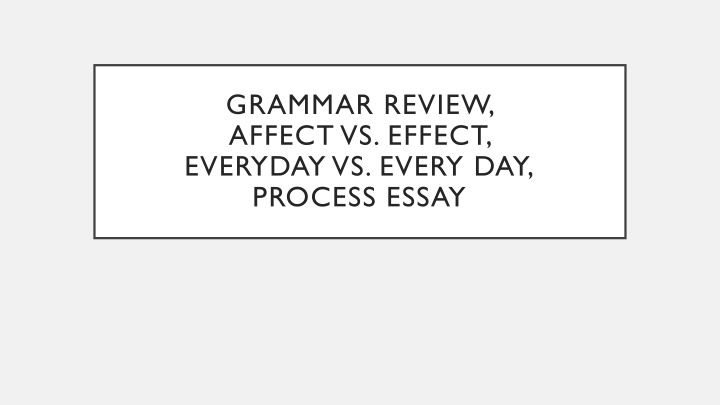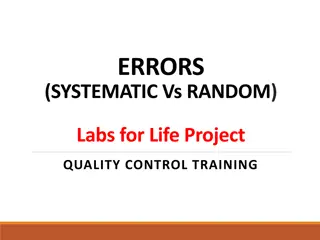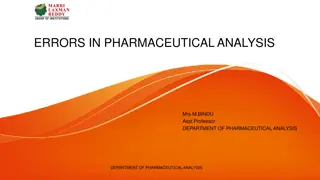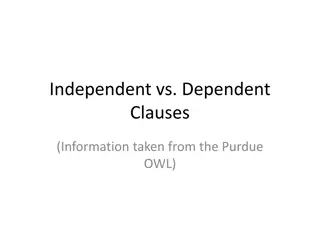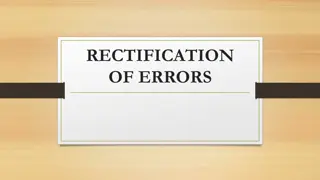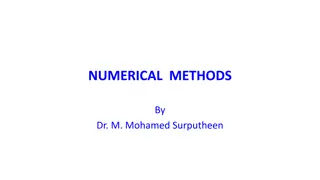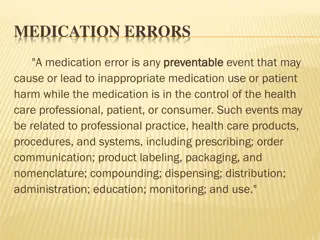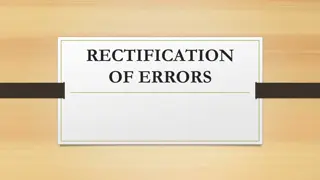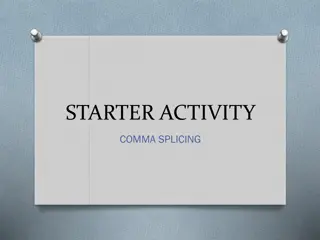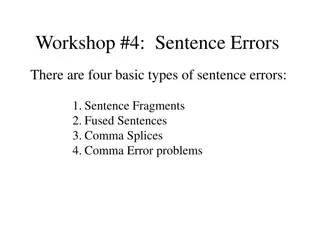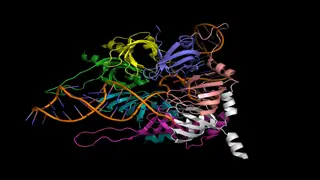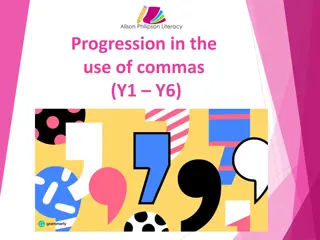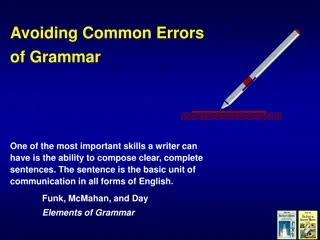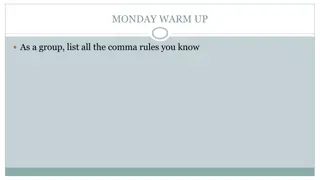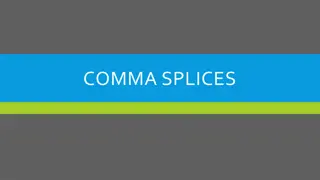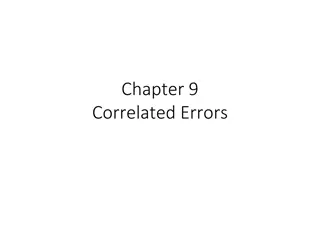Grammar: Affect vs. Effect, Everyday vs. Every Day, and Comma Splice Errors
Explore the nuances of grammar in this comprehensive review covering topics such as affect vs. effect, everyday vs. every day, hyphens, dashes, comma usage in a series, fused sentences, and comma splice errors. Learn to identify and correct common grammatical mistakes through detailed examples and explanations, enhancing your writing skills.
Download Presentation

Please find below an Image/Link to download the presentation.
The content on the website is provided AS IS for your information and personal use only. It may not be sold, licensed, or shared on other websites without obtaining consent from the author.If you encounter any issues during the download, it is possible that the publisher has removed the file from their server.
You are allowed to download the files provided on this website for personal or commercial use, subject to the condition that they are used lawfully. All files are the property of their respective owners.
The content on the website is provided AS IS for your information and personal use only. It may not be sold, licensed, or shared on other websites without obtaining consent from the author.
E N D
Presentation Transcript
GRAMMAR REVIEW, AFFECT VS. EFFECT, EVERYDAY VS. EVERY DAY, PROCESS ESSAY
GRAMMAR REVIEW Hyphens Dashes Commas in a Series (a, b, and c) Fused Sentences and Comma Splice Errors Semicolons *Affect vs. Effect *Everyday vs. Every Day
COMMA SPLICE MOST FREQENTLY MADE GRAMMATICAL MISTAKE! A comma splice occurs when two sentences are incorrectly joined with just a comma. Identifying comma splice errors is difficult, fixing them is easy.
COMMA SPLICES WHICH OF THE FOLLOWING SENTENCES CONTAIN COMMA SPLICE ERRORS? We left the stadium early, our team was losing badly. If the Cubs don t win the World Series this year, thousands of Chicago baseball fans will enter a deep and dark depression. The pitcher delivered a nasty fastball, Sammy Sosa was able to connect with the ball and hit a home run. After it was revealed that Sammy Sosa took performance- enhancing drugs, many loyal fans became sad and disillusioned.
WAYS TO FIX COMMA SPLICES It s nearly half past five, we ll never get to Seattle before dark. 1. Use a period to create two separate sentences. It s nearly half past five. We ll never get to Seattle before dark. 2. Join the sentences with a comma and a coordinating conjunction (and, or, nor, for, so, but, yet). It s nearly half past five, so we ll never get to Seattle before dark. 3. Join the sentences with a semicolon. It s nearly half past five; we ll never get to Seattle before dark. 4. Join the sentences with a semicolon and a transitional word or phrase (followed by a comma), such as however, therefore, or for example. It s nearly half past five; therefore, we ll never get to Seattle before dark. 5. Create a complex sentence by adding subordinating conjunction (although, because, if, as, when, etc.) to one of the sentences. Because it s nearly half past five, we ll never get to Seattle before dark.
PARTS OF SPEECH Noun word that represents a person, place, thing, or idea (ex. Donald Trump, Helena, cat, beauty) Adjective word that modifies (describes, gives more information about) a noun (ex. old, stupid, yellow) indicates what something is like Verb word that represents an action or state (ex. to run, to sing, to be) Adverb word that modifies (describes, gives more information about) a verb indicates how something is done The yellow cat lazily watched the frantic mouse. I am crabby when I get up early.
GRAMMAR GIFT: AFFECT VS. EFFECT Affect (verb) to influence Missing homework assignments will negatively affect your grade. Alan never lets the bad attitudes of other people affect him. Effect (noun) result; influence Will eating Cheetos for breakfast every day have a noticeable effect on my health? The combination of drinking protein shakes and lifting weights can have quick and visible effects on your physique.
AFFECT VS. EFFECT LESSER KNOWN DEFINITIONS Affect (noun) observable display of emotion During an intense game of basketball, Lebron James often exhibits a very anguished affect. Effect (verb) to put something into effect; to cause to happen; to implement The changes to class grading policy will be effected on Friday, October 28. Mother Teresa worked hard to effect change in the community of Calcutta, India.
GRAMMAR GIFT: EVERYDAY VS. EVERY DAY Use ONE WORD (everyday) as an adjective. Brushing your teeth should be an everyday routine. Overcrowding at Starbucks is an everyday occurrence. USE TWO WORDS (every day) as an adverb. I brush my teeth at least twice every day. Every day I try to remember all the things I m grateful for.
GETTING COFFEE IS HARD TO DO Process explanation Why not instructions?
GETTING COFFEE IS HARD TO DO: TAKEAWAY #1 THE 2NDPERSON ( YOU ) In process writing, the use of the second person you has the benefit of putting the reader in the action. This is a logical choice as you are often explaining to your reader how to perform a task or helping them understand how something is done. The second person you can also stand in for the author himself. In Getting Coffee Is Hard to Do, Stanley Fish uses the second person you in describing the process of getting coffee, but he s clearly detailing his own personal experiences in the process. The second person you is also the point of view used for imperative commands, so it makes a lot of sense to use it in instructions. The second person you sounds informal and conversational. It can make your writing sound more welcoming and natural. If you are patient and stay in line (no bathroom breaks), you get to put in your order, but then you have to find a place to stand while you wait for it.
GETTING COFFEE IS HARD TO DO: TAKEAWAY #2 EVEN A PROCESS ESSAY IS ALLOWED TO HAVE A POINT Although process writing can and should be straightforward, it doesn t mean that it can t make a significant point. The thesis statement of Stanley Fish s essay Getting Coffee Is Hard to Do could be stated as: You will face a coordination problem if you want to get a cup of coffee because of the growing practice of shifting the burden of labor to the consumer. Fish wants to describe how complicated it is to get a cup of coffee in order to serve the greater purpose of highlighting a societal problem.
GETTING COFFEE IS HARD TO DO: TAKEAWAY #3 THE (EXAGGERATED) COMPARISON The first three paragraphs of Fish s essay follow this structure: Define coordination problem List examples of coordination problems Introduce the topic (getting a cup of coffee) as a coordination problem The author compares getting a cup of coffee to being a general deploying troops, tanks, helicopters, food, tents, and medical supplies. This exaggerated comparison serves to: Add interest (the essay at first seems to be going in an unexpected direction) Set up the author s tone of frustration Put the topic into some kind of context Add humor
GETTING COFFEE IS HARD TO DO: TAKEAWAY #4 THE SHORT SENTENCE-PARAGRAPH And these days, you will face a coordination problem if you want to get a cup of coffee. Direct, straightforward delivery of main idea. Dramatic emphasis on an unlikely argument. Finally, the coffee arrives. Exasperation The only part the customer is not really responsible for. I won t even talk about the problem of finding a seat. Frustration he s not even going to go into it.
GETTING COFFEE IS HARD TO DO: TAKEAWAY #5 CONVERSATIONAL VOICE In this essay, Stanley Fish writes in a relatable, conversational voice, which you can achieve even in process writing. Use contractions and informal expressions Now it s all wood or concrete floors, lots of earth tones Well, it s Sunday morning, and you re probably reading this with a cup of coffee. And these days , it turns out , the trick is , And worst of all , At least, It s just a question of , etc. Use dashes and parentheses If you are patient and stay in line (no bathroom breaks) The coffee shop experience is just one instance of the growing practice of shifting the labor of burden to the consumer gas stations, grocery and drug stores, bagel shops (why should I put on my own cream cheese?), airline check-ins, parking lots.
STEPS VS. STAGES: STEPS = INDIVIDUAL, SPECIFIC STEPS STAGES = GENERAL PHASES How to Enjoy Fly Fishing (Even If You Never Catch a Fish) PREPARE Assemble gear Dress appropriately Have a Plan B BE COACHABLE Listen carefully Be enthusiastic Remember, it s not about you BE ONE WITH NATURE Focus on sensations Enjoy the silence Think about the fish GIVE UP AND RELAX Reading materials, music Nap Take photographs
HOW-TO ESSAY TOPICS Do pick a topic that you are knowledgeable about. Make it personal and unique to you. What are you going to ADD to the subject? Do pick a topic that you can write about with humor and originality. Don t pick a topic that is too simple (how to make a peanut butter and jelly sandwich) unless you can figure out a clever and interesting way to write about it. HOW TO SNEAK OUT OF YOUR PARENTS HOUSE HOW TO CHANGE A TODDLER S DIAPER HOW TO MAKE A CHICAGO-STYLE HOT DOG HOW TO BE A LAX BRO HOW TO IMPRESS WOMEN HOW TO MAKE PEOPLE LIKE YOU HOW TO GET OUT OF HIGH SCHOOL ALIVE HOW TO DRESS FOR SUCCESS HOW TO AVOID EVER PAYING FOR ANYTHING HOW TO BUILD A FORT HOW TO HIKE MOUNT HELENA HOW TO GET OUT OF GOING TO SCHOOL HOW TO TAKE IT EASY HOW TO TAKE A PERFECT SELFIE
